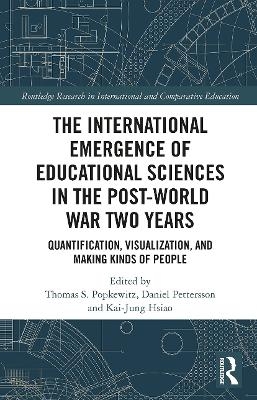
The International Emergence of Educational Sciences in the Post-World War Two Years
Routledge (Verlag)
978-0-367-56907-5 (ISBN)
The book examines how cybernetics and systems theories traveled and were assembled to turn schools into social experiments and laboratories for change. Explored are the new comparative technologies of quantification and the visualization of educational data used in the methods of mass observation. The sciences not only about the present but also the potentialities of societies and people in the psychologies of childhood; concerns for individual development, growth, and creativity; teacher education; and the quantification and assessments of educational systems. The book also explores how the categories and classifications of the sciences formed at intersections with the humanities, the arts, and political practices.
This informative volume will be of interest to researchers, academics, and postgraduate students in the fields of curriculum studies, the history of the social sciences, the history of education, and cultural studies, and to educators and school leaders concerned with education policy.
Thomas S. Popkewitz is Professor of Curriculum and Instruction and the Holtz Center for Science & Technology Studies at the University of Wisconsin, Madison, USA. Daniel Pettersson is Associate Professor in Pedagogy at the University of Gävle and Uppsala University, Sweden. Kai-Jung Hsiao is a PhD student of Curriculum and Instruction at the University of Wisconsin, Madison, USA.
1 How Contemporary Educational Sciences Became Reasonable: The International Emergence of Educational Sciences in the Post-World War Two Years
Thomas S. Popkewitz, Daniel Pettersson, and Kai-Jung Hsiao
PART 1: MOBILIZING SCIENCE AND DESIRES FOR BETTER SOCIETIES
2 Science as "the Beacon" for Social Change: The Reason of Systems in American Educational Research and Development
Thomas S. Popkewitz
3 Tactile Pedagogies in the Postwar: Cybernetics, Art, and the Production of a New Educational Rationale
Inés Dussel
4 Science as Utopia: Infrastructures, Pedagogies and the Prophecy of Design
Junzi Huang
PART 2: LOCATIONLESS LOGICS AND FABRICATING DIFFERENCES
5 Post-World War Two Psychology, Education and the Creative Child: Fabricating Differences
Catarina Silva Martins
6 Objectification of Human Nature: "Adolescent" as a Taxonomy of Postwar-Taiwan Actor
Kai-Jung Hsiao
7 The Development of the Child and National Progress: Behaviorism and Cultural Deprivation in Brazil
Ana Laura Godinho Lima
8 The Embrace of Systems in Post-World War Two Teacher Education Research
Sun Young Lee
PART 3: SYSTEMS, CYBERNETICS: IMAGINEERING BELONGING AS SOCIAL DIFFERENTIATION
9 Diagrams of Feedback: Behaviorism, Programmed Instruction and Cybernetic Planning
Antti Saari
10 From "Threat" to "Treat": Cybernetics in the Soviet Union
Tatiana Mikhaylova & Daniel Pettersson
11 School Differentiation and Re-Forming Human Kinds in Swedish Welfare State Education after the Second World War
Gun-Britt Wärvik, Sverker Lindblad, Daniel Pettersson and Caroline Runesdotter
12 Quantification of an Educational System: Numbers in the Social Differentiation of Brazil
Natália de Lacerda Gil
Index
| Erscheinungsdatum | 11.11.2020 |
|---|---|
| Reihe/Serie | Routledge Research in International and Comparative Education |
| Zusatzinfo | 1 Tables, black and white; 8 Line drawings, black and white |
| Verlagsort | London |
| Sprache | englisch |
| Maße | 152 x 229 mm |
| Gewicht | 381 g |
| Themenwelt | Sozialwissenschaften ► Pädagogik ► Allgemeines / Lexika |
| Sozialwissenschaften ► Pädagogik ► Bildungstheorie | |
| ISBN-10 | 0-367-56907-8 / 0367569078 |
| ISBN-13 | 978-0-367-56907-5 / 9780367569075 |
| Zustand | Neuware |
| Haben Sie eine Frage zum Produkt? |
aus dem Bereich


